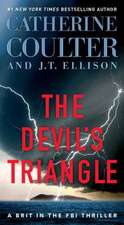Lord of Raven's Peak: Viking Era, cartea 3
Autor Catherine Coulter Anne Flosniken Limba Engleză Digital – 25 iun 2018
Merrik Haraldsson, the younger brother of Rorik, the Lord of Hawkfell Island, embarks on a journey that begins in Kiev where he comes away with two slaves--Laren and her younger brother. Laren wants to tell stories to earn enough silver and gold to buy her and her little brother from Merik, only he refuses to sell her. And now that she's his, he must protect her when she's accused of murder, then save her yet again when he discovers her secrets.
Preț: 68.67 lei
Nou
Puncte Express: 103
Preț estimativ în valută:
11.59€ • 12.11$ • 9.60£
11.59€ • 12.11$ • 9.60£
Indisponibil temporar
Doresc să fiu notificat când acest titlu va fi disponibil:
Se trimite...
Preluare comenzi: 021 569.72.76
Specificații
ISBN-13: 9781978629646
ISBN-10: 1978629648
Dimensiuni: 135 x 170 x 13 mm
Greutate: 0.08 kg
Editura: Brilliance Audio
Colecția Viking Era
Seria Viking Era
ISBN-10: 1978629648
Dimensiuni: 135 x 170 x 13 mm
Greutate: 0.08 kg
Editura: Brilliance Audio
Colecția Viking Era
Seria Viking Era
Notă biografică
Catherine Coulter is the #1 New York Times bestselling author of over eighty novels, including the FBI Thriller series and the Brit in the FBI international thriller series, co-written with J.T. Ellison. Coulter lives in Sausalito, California with her ultra-talented husband and three critters, Cleo, Peyton, and Eli.
Recenzii
"Another spry Viking romance...A grand adventure." -Booklist
Extras
1 The Slave Market of Khagan-Rus
Kiev, A.D. 916
THE SLAVE RING was as sweet-smelling as it would
ever be, Merrik thought. It was early morning and still
cool; a breeze off the river Dnieper rustled gently over
the scores of unwashed bodies. It was July and the water
below the embankment flowed smoothly and serenely
within the Dnieper’s broad banks now, the ice
floes having finally melted early the month before. The
consequent flooding had eased now as well, sending
cleansing river smells upward.
The sun had just risen behind Kiev, showing bright
gold behind the endless stretch of barren hills and jagged
mountains to the east. The stench of winter-dirty
furs and scrawny bodies too long unwashed wouldn’t
offend the nostrils until later in the day, even here in
the slave ring. The only thing here to offend anyone was
the abject human misery, and that was a condition so
familiar in a place like this, it hardly bore notice.
Merrik Haraldsson had unfastened the pounded silver
brooch and slipped its sharp point from the soft otter
fur cloak. He’d slung the cloak over his arm as he
walked toward the slave market’s perimeter. He’d come
from his longboat, The Silver Raven, moored below at
a long wooden pier that lay in a protected inlet of the
Dnieper just below Kiev. He wasn’t sweating now, but
the climb was a hard one, and he’d walked briskly,
wanting to be here as early as possible to find a slave
his mother would approve before they’d been picked
over and only the sick and wasted were left.
The Khagan-Rus slave market was set apart from the
town. Its name was the same as that of the prince of
Kiev: a reminder that there was a tax at each purchase
that would go directly into Prince Khagan-Rus’s capacious
pockets.
Merrik turned to Oleg, a man he’d known since they’d
both been boys—wild and passionate and eager to best
their older brothers and acquire their own longboats to
trade and fight and grow rich, rich enough to buy their
own farmsteads sometime in a future that they pondered
only rarely, richer even than their fathers and
older brothers.
‘‘We will leave after I buy a female slave. Keep a
sharp eye, Oleg, for I don’t want a drudge for my
mother’s longhouse, or a sloe-eyed maid that would unduly
strain my father’s faithfulness. He has had no concubine
for thirty years. I don’t want him to begin now.’’
‘‘Your mother would break his head open were he
ever to gaze fondly at another woman and you well
know it.’’
Merrik grinned. ‘‘My mother is a woman of strong
passions. Very well, then, I think of my brother’s wife.
Sarla is a shy little thing and could easily be governed
by a clever female, slave or no.’’
‘‘And your brother is a man of strong appetites, Merrik.
A female doesn’t necessarily have to be toothsome
for Erik to want her. Look at Caylis, I’ll grant you she’s
a beauty even though her son is close to ten years old
now, but Megot, whom he beds just as much, is a plump
pullet and her chins shake when she laughs.’’
‘‘Aye, ’tis true. We must consider many factors before
I pick the right female. My mother needs a female slave
who will be loyal to her and work only for her. My
mother wants to teach her to spin, for her fingers stiffen
and give her pain now. Roran told me this should be an
excellent selection this morning, many slaves were
brought in just last night from Byzantium.’’
‘‘Aye, and the great golden city of Miklagard. How I
should like to voyage there, Merrik. It is the greatest
city in the world, it is said.’’
‘‘Aye, ’tis difficult to believe that more than half a
million people live there. Next summer we will have to
build a stronger longboat, for the currents and rapids
below Kiev are vicious. There are seven rapids and each
is more deadly than the last. The one called Aifur kills
more men than all the others combined. Even the portage
is dangerous for there are many vicious tribes living
along the Dnieper waiting for men to come ashore
with their longboats to drag them overland to beyond
the rapids. Aye, we’ll join an armada of other trading
ships for protection. I don’t wish to die just to see Miklagard
and the Black Sea.’’
‘‘The Aifur, huh?’’ Oleg grinned at Merrik. ‘‘You have
been talking to other traders, Merrik. You are already
preparing this in your mind, aren’t you?’’
‘‘Aye, I am, but Oleg, we grow rich trading in Birka
and Hedeby, for we are known there and trusted. The
Irish slaves brought more silver than even I believed
possible. And this year we grew even richer trading our
Lapp furs in Staraya Ladoga. Remember that man who
bought every reindeer comb we had? He told me he had
more women than he wanted and all of them begged
combs from him. He said their hair would beggar him.
‘‘Nay, we will wait to travel to Miklagard next year.
Be content.’’
‘‘ ’Tis you who aren’t content, Merrik.’’
‘‘Very well, I will be patient. We return home with
more silver than our fathers and brothers have. We are
rich, my friend, and there is no one to gainsay us now.’’
‘‘Forget not that lovely blue silk that came from the
Caliphate, at least that’s what Old Firren claimed.’’
‘‘He’s a liar who has grown over the years to believe
his own words, but the material is beyond beautiful.’’
‘‘Aye, and you will continue the lie. Will you give it
to your bride? You plan to buy your own farmstead now,
Merrik? Or perhaps return with your bride to her
father’s?’’
Merrik said nothing, but he frowned. During the winter,
his father had negotiated with the Thoragassons,
not bothering to tell his son until the two fathers had
come to agreement. Merrik barely knew the seventeenyear-
old Letta. He’d felt anger at his father at such interference,
for Merrik was, after all, nearly twenty-four
years old, but he’d said nothing. The girl was lovely,
appeared gentle, and her dowry would be impressive.
He would look closely at her when he returned home,
then make his decision. But if he wedded her he would
have to leave his father’s farmstead, for already his eldest
brother and his wife of two years, the gentle Sarla,
lived there and would continue there after their parents
died. Surely they would have many babes, and soon it
would be too crowded, what with all his father’s and
brother’s people and his own men and slaves as well.
He shook his head. He disliked thinking of leaving his
home, but if he wed, he would have to take his wife
somewhere, and there was no more land in Vestfold
that could be farmed. His brother, Rorik, had gone to
Hawkfell Island, just off the coast of Britain, and had
prospered. Ah, but to leave his home, it was something
he didn’t yet wish to do. He also disliked knowing he
was now rich enough to leave.
He said only to Oleg, ‘‘A farmstead and a wife are two
decisions a man must weigh carefully.’’
‘‘That is what my father says, but he is always smiling
at me when he says it. Think you he wants me out
of his longhouse?’’
There were at least eighty slaves in the pit, as it was
called. They were of all ages, both sexes in nearly equal
numbers, some few still proud, their shoulders squared,
but most stood still as stones with their heads bowed,
knowing what was to come, perhaps praying to their
gods that the men or women who bought them would
be kind.
Merrik walked slowly through the rows. The young
women were lined up on one side, the older women behind
them, and the boys and men on the other side of
the pit. There were guards only behind the men, whips
in their hands, watching, ever watching, silent and
menacing, but they really weren’t concerned. None of
this group would cause any problems. They’d been broken
sufficiently since they’d been captured on raids,
some of them had been slaves for decades, some even
born of slaves.
It was a sight Merrik had seen since he’d been a boy
when his father had first taken him to York to buy
slaves. This was nothing new, save that this slave market
wasn’t as grim or as dirty and didn’t smell yet since
it was so early in the day and they were in the cool fresh
air of Kiev and not in the Danelaw where the Saxons
smelled as bad as the slaves, and their stench filled the
air. Here a man could breathe as he made his selections.
Many of the girls were fine looking and appeared
clean enough. They were from all parts of the world,
some with yellowish skin and beautifully slanted eyes
and the thickest black hair he’d ever seen, long and
board-straight. They were slight, and all had their
heads down. There were redheads and blonds from
Samarkand, some very tall and broadly built, others
squat with heavy torsos and short legs who hailed from
Bulgar and beyond. Merrik saw a girl who pleased him.
He realized she pleased him too much, for she had the
pale golden hair of his people, pale clear flesh, and a
long slender body. He felt a mild spurt of lust and shook
his head. No, she wouldn’t do for his mother. His
brother would soon have her flat on her back, if Merrik
didn’t take her first. He wouldn’t provide another concubine
for his brother Erik, for unlike his brother, he
saw how much it hurt Sarla when her husband ignored
her at night, then took himself off to bed with one of his
women.
He must search for a comely face, but not too comely,
certainly no more than a pleasant face, perhaps one on
the broad, flat side. His brother disliked thin women;
Merrik searched out females with hollow cheeks, showing
bones. He selected three possible young slave girls,
turned to search out the slave-auction merchant, Valai,
to bargain. As he waited for Valai to finish with a Swedish
merchant who smelled of rotted fish and stale sex,
he realized he’d seen that same merchant—so obese he
wheezed even as he spoke—the night before with a
dozen more merchants at the house of a man who had
many female slaves to sell. Each merchant was given a
girl and they had, each one in turn, with all the others
looking on, stripped the girls and had sex there on the
wooden benches that lines the inside wall of the great
hall. Merrik had felt immediate lust, for he saw that
there were still half a dozen girls left and one would be
his, until he saw a merchant over a girl, and the girl
was lying there, her eyes closed, so still she could have
been dead, and the fat merchant had shoved into her,
huffing, his great belly shaking, until, finally, he’d
spilled his seed inside her. She’d never opened her eyes.
Merrik saw tears seeping from beneath her closed eyelids,
streaking down her face. He had left.
He turned away from the fat merchant, and looked
indifferently at the long line of men and boys. He froze.
He didn’t know why that of all the scores of men he
looked directly at the boy, but somehow, once he had,
he couldn’t seem to look away. The boy was perhaps
twelve years old, not older than thirteen. He was so thin
Merrik could see the long bones clearly in his bare
arms, the knobby scabbed elbows, the wrists so thin he
could wrap his fingers about them twice over, long narrow
hands held loosely to his sides. His legs, bare from
the knees down were just as thin and very white where
they weren’t blackened and streaked with filth and
scabs from cuts. He could even see the pale blue veins.
The boy was pathetic and would die soon if he weren’t
bought by a master who would at least feed him properly.
He’d doubtless been mistreated in the past. He
was wearing rags and a ripped filthy sealskin.
Not that it concerned Merrik. The boy was a slave
and would be sold, perhaps to a cruel master, perhaps
not, perhaps to a master who would let him buy his
freedom someday. It was a common practice and perhaps
the lad would be lucky. It didn’t matter. Ah, but
there was something about him that held Merrik very
still, that wouldn’t allow him to look away. But he
forced himself to look away. He wanted to sail from
Kiev this morning and there was much he still had to
do before leaving. He turned to go when the boy
denly looked up and their eyes met. The boy’s eyes were
a gray-blue, two colors that sounded normal, even common,
particularly in Norway, but this boy’s eyes were
different. The gray color was deeper than the rich pewter
bowl Merrik’s mother had received as a gift upon
her wedding to his father, and the blue darker than a
sea in winter. He could tell that the boy’s flesh was very
white despite all the dirt. His brows were dark and
well-drawn but the tangled, filthy mat of hair on his
head was too dirty and oily to determine its true color.
It was simply dull and dark and filthy. The boy was
beneath notice were it not for those eyes. They caught
Merrik cold. Eyes weren’t made filthy; but eyes could
reflect a man or woman’s thoughts, and the boy’s eyes
were drained empty, dull, accepting. Certainly that
wasn’t odd. But then, quite suddenly, there was a remarkable
shift—where there’d been emptiness, there
was now coldness and a look of defiance that would
probably get the boy killed or beaten to death if he
didn’t learn to mask that spark better. In a flash that
look of defiance turned to one of anger, immense anger
that held such violence and rage, it shook Merrik. Then,
just as suddenly, the boy’s eyes became blank again, all
that fury and passion buried beneath hopelessness and
awareness that his lot in life was that of a slave and
probably would remain so until he died. It was as if
Merrik could see the boy withdrawing into himself. He
could see him dying and accepting death before his
eyes.
Merrik roused himself from this ridiculous revery.
The boy was a slave, nothing more. It didn’t matter if
he’d been captured from a hovel in a small village or
from a rich farmhouse. Merrik would never see him
again after he left the slave pit. He would cease to think
about him the moment his hand was on the rudder of
his longboat and the wind from the sails was sharp in
his face. He shrugged and shook his head. He turned
then when Oleg tugged on his arm to point out another
slave.
He heard an agonized cry and turned back. The very
fat merchant, the same Swedish merchant Merrik had
seen the night before, the same merchant who had just
been dealing with Valai, had grabbed the boy’s arm and
was pulling him away from the line of other boys and
men. He was shrieking that he’d paid too much silver
for the filthy little garla, or puny pig, and he would shut
up now or be very sorry for it. But the shouts and cries
weren’t all coming from the boy. The most piercing ones
were from a small child who had a death grip on the
boy’s other hand. By all the gods, Merrik thought, it
was the boy’s little brother and the man hadn’t bought
him. The child was screaming, terrified cries that were
pathetic, and it made something deep inside him twist
and cramp and he didn’t understand it. He took a step
forward, then saw the fat merchant slap the boy, for he
was now trying to grab his little brother. The merchant
then kicked the child hard. Merrik watched him fall
onto his face and remain still, saw him just lie there,
huddled into himself, sobbing. The boy hit the merchant,
not a hard hit, for Merrik doubted he had the
strength, but a fist in that oaf’s fat belly that surely had
to hurt. The merchant raised a fist, but then lowered it.
He cursed, threw the boy over his shoulder and walked
away.
The child rose slowly, holding his ribs, and just stood
there, not crying out now, just staring after his brother,
and suddenly, quite without warning, Merrik couldn’t
bear it. Something gave way deep inside him. No, he
couldn’t bear it, he wouldn’t bear it. ‘‘Wait here,’’ he said
to Oleg.
He was on his knees in front of the child. He gently
cupped the child’s chin in his large hand and lifted it.
The tears were still streaming down his dirty face, leaving
obscene white marks in their wake. ‘‘What is your
name?’’ Merrik said.
The little boy sniffed loudly. He stared at Merrik, his
small features so drawn with fear that Merrik said, ‘‘I
won’t hurt you. What is your name?’’
The child said quite clearly, his words only mildly
accented, ‘‘My name is Taby. That fat man took my—’’
His voice died, just stopped cold. He looked at Merrik
and the tears were thicker now and the child was sniveling
and hiccuping. And there was such fear in the
child’s eyes that Merrik wanted to snarl like a wolf, but
he didn’t. He didn’t want the child to fear him more.
He said only, his voice low, slow, ‘‘What is your
brother’s name?’’
The child ducked his head down and said nothing.
‘‘Is he your brother?’’
The child nodded, nothing more. He was very afraid.
Merrik didn’t blame him.
Merrik had looked up as he’d spoken, but the merchant
was gone. The child was alone. He looked down
at that bowed head, saw the child’s thin shoulders
heave and shake with his crying. He knew well what
became of children who were alone and were slaves.
Most of them died, and if they didn’t, well, perhaps
what became of them was even worse. Suddenly, Merrik
didn’t want this child to die. He took the little boy’s
hand, felt the filth on the child’s flesh, felt the delicate
bones that would snap like twigs at the slightest pressure,
and something lurched inside him. The child
wasn’t as thin as his brother, and Merrik knew why.
The older brother had given what food he’d gotten to
the little boy. ‘‘You will come with me, Taby. I will take
you from this place. You will trust me.’’
The child shuddered at his words and didn’t raise his
head or move.
‘‘I know it is difficult for you to believe me. Come,
Taby, I won’t hurt you, I swear it.’’
‘‘My brother,’’ the child whispered, and he raised his
head then and looked at Merrik with pathetic hope. ‘‘My
brother is gone. What will happen to him?’’
‘‘Come,’’ he said, ‘‘trust me.’’ He walked away from
the line of slaves, the little boy’s hand tucked firmly in
his large one.
Merrik knew he would buy the child for a very small
weight of silver, and he was right. Soon he had completed
his business with Valai, a small man with a
twinkling eye and a shrewd, ruthless brain. Valai
wasn’t, however, necessarily cruel, just matter-of-fact
and spoke his mind when it couldn’t hurt his trade. He
said to Merrik, ‘‘I know you aren’t a pederast, thus the
child will bring you no pleasure and will be only a burden
to you.’’
‘‘Aye, but it doesn’t matter. I want him.’’
‘‘It’s possible that someone would buy him and he
would be raised well, used only to service his masters.
Not a bad life for such as he. Better than dying, which
is what would happen at many other places.’’
Merrik said nothing but he felt his guts surge with
rage. Aye, the best that could happen would be that the
child would be raped endlessly, then trained to pleasure
men, those damned Arabs who kept both sexes in their
keeping to pleasure them at their whim. After Taby
grew up and no longer had a boy’s allure, he would be
thrown into the fields to work over crops until he died.
And Merrik couldn’t bear that. He looked down at Taby.
No, he wouldn’t allow that to happen. He didn’t
tion what he would do with the child. He paid Valai,
then went to find Oleg.
If Oleg believed him mad, he said nothing, merely
stared at the small boy, then grinned and nodded, rubbing
his hands together. Oleg always loved an adventure.
Merrik realized he was thinking he would grant
him one this day. And Oleg would probably be right,
Merrik thought.
Kiev, A.D. 916
THE SLAVE RING was as sweet-smelling as it would
ever be, Merrik thought. It was early morning and still
cool; a breeze off the river Dnieper rustled gently over
the scores of unwashed bodies. It was July and the water
below the embankment flowed smoothly and serenely
within the Dnieper’s broad banks now, the ice
floes having finally melted early the month before. The
consequent flooding had eased now as well, sending
cleansing river smells upward.
The sun had just risen behind Kiev, showing bright
gold behind the endless stretch of barren hills and jagged
mountains to the east. The stench of winter-dirty
furs and scrawny bodies too long unwashed wouldn’t
offend the nostrils until later in the day, even here in
the slave ring. The only thing here to offend anyone was
the abject human misery, and that was a condition so
familiar in a place like this, it hardly bore notice.
Merrik Haraldsson had unfastened the pounded silver
brooch and slipped its sharp point from the soft otter
fur cloak. He’d slung the cloak over his arm as he
walked toward the slave market’s perimeter. He’d come
from his longboat, The Silver Raven, moored below at
a long wooden pier that lay in a protected inlet of the
Dnieper just below Kiev. He wasn’t sweating now, but
the climb was a hard one, and he’d walked briskly,
wanting to be here as early as possible to find a slave
his mother would approve before they’d been picked
over and only the sick and wasted were left.
The Khagan-Rus slave market was set apart from the
town. Its name was the same as that of the prince of
Kiev: a reminder that there was a tax at each purchase
that would go directly into Prince Khagan-Rus’s capacious
pockets.
Merrik turned to Oleg, a man he’d known since they’d
both been boys—wild and passionate and eager to best
their older brothers and acquire their own longboats to
trade and fight and grow rich, rich enough to buy their
own farmsteads sometime in a future that they pondered
only rarely, richer even than their fathers and
older brothers.
‘‘We will leave after I buy a female slave. Keep a
sharp eye, Oleg, for I don’t want a drudge for my
mother’s longhouse, or a sloe-eyed maid that would unduly
strain my father’s faithfulness. He has had no concubine
for thirty years. I don’t want him to begin now.’’
‘‘Your mother would break his head open were he
ever to gaze fondly at another woman and you well
know it.’’
Merrik grinned. ‘‘My mother is a woman of strong
passions. Very well, then, I think of my brother’s wife.
Sarla is a shy little thing and could easily be governed
by a clever female, slave or no.’’
‘‘And your brother is a man of strong appetites, Merrik.
A female doesn’t necessarily have to be toothsome
for Erik to want her. Look at Caylis, I’ll grant you she’s
a beauty even though her son is close to ten years old
now, but Megot, whom he beds just as much, is a plump
pullet and her chins shake when she laughs.’’
‘‘Aye, ’tis true. We must consider many factors before
I pick the right female. My mother needs a female slave
who will be loyal to her and work only for her. My
mother wants to teach her to spin, for her fingers stiffen
and give her pain now. Roran told me this should be an
excellent selection this morning, many slaves were
brought in just last night from Byzantium.’’
‘‘Aye, and the great golden city of Miklagard. How I
should like to voyage there, Merrik. It is the greatest
city in the world, it is said.’’
‘‘Aye, ’tis difficult to believe that more than half a
million people live there. Next summer we will have to
build a stronger longboat, for the currents and rapids
below Kiev are vicious. There are seven rapids and each
is more deadly than the last. The one called Aifur kills
more men than all the others combined. Even the portage
is dangerous for there are many vicious tribes living
along the Dnieper waiting for men to come ashore
with their longboats to drag them overland to beyond
the rapids. Aye, we’ll join an armada of other trading
ships for protection. I don’t wish to die just to see Miklagard
and the Black Sea.’’
‘‘The Aifur, huh?’’ Oleg grinned at Merrik. ‘‘You have
been talking to other traders, Merrik. You are already
preparing this in your mind, aren’t you?’’
‘‘Aye, I am, but Oleg, we grow rich trading in Birka
and Hedeby, for we are known there and trusted. The
Irish slaves brought more silver than even I believed
possible. And this year we grew even richer trading our
Lapp furs in Staraya Ladoga. Remember that man who
bought every reindeer comb we had? He told me he had
more women than he wanted and all of them begged
combs from him. He said their hair would beggar him.
‘‘Nay, we will wait to travel to Miklagard next year.
Be content.’’
‘‘ ’Tis you who aren’t content, Merrik.’’
‘‘Very well, I will be patient. We return home with
more silver than our fathers and brothers have. We are
rich, my friend, and there is no one to gainsay us now.’’
‘‘Forget not that lovely blue silk that came from the
Caliphate, at least that’s what Old Firren claimed.’’
‘‘He’s a liar who has grown over the years to believe
his own words, but the material is beyond beautiful.’’
‘‘Aye, and you will continue the lie. Will you give it
to your bride? You plan to buy your own farmstead now,
Merrik? Or perhaps return with your bride to her
father’s?’’
Merrik said nothing, but he frowned. During the winter,
his father had negotiated with the Thoragassons,
not bothering to tell his son until the two fathers had
come to agreement. Merrik barely knew the seventeenyear-
old Letta. He’d felt anger at his father at such interference,
for Merrik was, after all, nearly twenty-four
years old, but he’d said nothing. The girl was lovely,
appeared gentle, and her dowry would be impressive.
He would look closely at her when he returned home,
then make his decision. But if he wedded her he would
have to leave his father’s farmstead, for already his eldest
brother and his wife of two years, the gentle Sarla,
lived there and would continue there after their parents
died. Surely they would have many babes, and soon it
would be too crowded, what with all his father’s and
brother’s people and his own men and slaves as well.
He shook his head. He disliked thinking of leaving his
home, but if he wed, he would have to take his wife
somewhere, and there was no more land in Vestfold
that could be farmed. His brother, Rorik, had gone to
Hawkfell Island, just off the coast of Britain, and had
prospered. Ah, but to leave his home, it was something
he didn’t yet wish to do. He also disliked knowing he
was now rich enough to leave.
He said only to Oleg, ‘‘A farmstead and a wife are two
decisions a man must weigh carefully.’’
‘‘That is what my father says, but he is always smiling
at me when he says it. Think you he wants me out
of his longhouse?’’
There were at least eighty slaves in the pit, as it was
called. They were of all ages, both sexes in nearly equal
numbers, some few still proud, their shoulders squared,
but most stood still as stones with their heads bowed,
knowing what was to come, perhaps praying to their
gods that the men or women who bought them would
be kind.
Merrik walked slowly through the rows. The young
women were lined up on one side, the older women behind
them, and the boys and men on the other side of
the pit. There were guards only behind the men, whips
in their hands, watching, ever watching, silent and
menacing, but they really weren’t concerned. None of
this group would cause any problems. They’d been broken
sufficiently since they’d been captured on raids,
some of them had been slaves for decades, some even
born of slaves.
It was a sight Merrik had seen since he’d been a boy
when his father had first taken him to York to buy
slaves. This was nothing new, save that this slave market
wasn’t as grim or as dirty and didn’t smell yet since
it was so early in the day and they were in the cool fresh
air of Kiev and not in the Danelaw where the Saxons
smelled as bad as the slaves, and their stench filled the
air. Here a man could breathe as he made his selections.
Many of the girls were fine looking and appeared
clean enough. They were from all parts of the world,
some with yellowish skin and beautifully slanted eyes
and the thickest black hair he’d ever seen, long and
board-straight. They were slight, and all had their
heads down. There were redheads and blonds from
Samarkand, some very tall and broadly built, others
squat with heavy torsos and short legs who hailed from
Bulgar and beyond. Merrik saw a girl who pleased him.
He realized she pleased him too much, for she had the
pale golden hair of his people, pale clear flesh, and a
long slender body. He felt a mild spurt of lust and shook
his head. No, she wouldn’t do for his mother. His
brother would soon have her flat on her back, if Merrik
didn’t take her first. He wouldn’t provide another concubine
for his brother Erik, for unlike his brother, he
saw how much it hurt Sarla when her husband ignored
her at night, then took himself off to bed with one of his
women.
He must search for a comely face, but not too comely,
certainly no more than a pleasant face, perhaps one on
the broad, flat side. His brother disliked thin women;
Merrik searched out females with hollow cheeks, showing
bones. He selected three possible young slave girls,
turned to search out the slave-auction merchant, Valai,
to bargain. As he waited for Valai to finish with a Swedish
merchant who smelled of rotted fish and stale sex,
he realized he’d seen that same merchant—so obese he
wheezed even as he spoke—the night before with a
dozen more merchants at the house of a man who had
many female slaves to sell. Each merchant was given a
girl and they had, each one in turn, with all the others
looking on, stripped the girls and had sex there on the
wooden benches that lines the inside wall of the great
hall. Merrik had felt immediate lust, for he saw that
there were still half a dozen girls left and one would be
his, until he saw a merchant over a girl, and the girl
was lying there, her eyes closed, so still she could have
been dead, and the fat merchant had shoved into her,
huffing, his great belly shaking, until, finally, he’d
spilled his seed inside her. She’d never opened her eyes.
Merrik saw tears seeping from beneath her closed eyelids,
streaking down her face. He had left.
He turned away from the fat merchant, and looked
indifferently at the long line of men and boys. He froze.
He didn’t know why that of all the scores of men he
looked directly at the boy, but somehow, once he had,
he couldn’t seem to look away. The boy was perhaps
twelve years old, not older than thirteen. He was so thin
Merrik could see the long bones clearly in his bare
arms, the knobby scabbed elbows, the wrists so thin he
could wrap his fingers about them twice over, long narrow
hands held loosely to his sides. His legs, bare from
the knees down were just as thin and very white where
they weren’t blackened and streaked with filth and
scabs from cuts. He could even see the pale blue veins.
The boy was pathetic and would die soon if he weren’t
bought by a master who would at least feed him properly.
He’d doubtless been mistreated in the past. He
was wearing rags and a ripped filthy sealskin.
Not that it concerned Merrik. The boy was a slave
and would be sold, perhaps to a cruel master, perhaps
not, perhaps to a master who would let him buy his
freedom someday. It was a common practice and perhaps
the lad would be lucky. It didn’t matter. Ah, but
there was something about him that held Merrik very
still, that wouldn’t allow him to look away. But he
forced himself to look away. He wanted to sail from
Kiev this morning and there was much he still had to
do before leaving. He turned to go when the boy
denly looked up and their eyes met. The boy’s eyes were
a gray-blue, two colors that sounded normal, even common,
particularly in Norway, but this boy’s eyes were
different. The gray color was deeper than the rich pewter
bowl Merrik’s mother had received as a gift upon
her wedding to his father, and the blue darker than a
sea in winter. He could tell that the boy’s flesh was very
white despite all the dirt. His brows were dark and
well-drawn but the tangled, filthy mat of hair on his
head was too dirty and oily to determine its true color.
It was simply dull and dark and filthy. The boy was
beneath notice were it not for those eyes. They caught
Merrik cold. Eyes weren’t made filthy; but eyes could
reflect a man or woman’s thoughts, and the boy’s eyes
were drained empty, dull, accepting. Certainly that
wasn’t odd. But then, quite suddenly, there was a remarkable
shift—where there’d been emptiness, there
was now coldness and a look of defiance that would
probably get the boy killed or beaten to death if he
didn’t learn to mask that spark better. In a flash that
look of defiance turned to one of anger, immense anger
that held such violence and rage, it shook Merrik. Then,
just as suddenly, the boy’s eyes became blank again, all
that fury and passion buried beneath hopelessness and
awareness that his lot in life was that of a slave and
probably would remain so until he died. It was as if
Merrik could see the boy withdrawing into himself. He
could see him dying and accepting death before his
eyes.
Merrik roused himself from this ridiculous revery.
The boy was a slave, nothing more. It didn’t matter if
he’d been captured from a hovel in a small village or
from a rich farmhouse. Merrik would never see him
again after he left the slave pit. He would cease to think
about him the moment his hand was on the rudder of
his longboat and the wind from the sails was sharp in
his face. He shrugged and shook his head. He turned
then when Oleg tugged on his arm to point out another
slave.
He heard an agonized cry and turned back. The very
fat merchant, the same Swedish merchant Merrik had
seen the night before, the same merchant who had just
been dealing with Valai, had grabbed the boy’s arm and
was pulling him away from the line of other boys and
men. He was shrieking that he’d paid too much silver
for the filthy little garla, or puny pig, and he would shut
up now or be very sorry for it. But the shouts and cries
weren’t all coming from the boy. The most piercing ones
were from a small child who had a death grip on the
boy’s other hand. By all the gods, Merrik thought, it
was the boy’s little brother and the man hadn’t bought
him. The child was screaming, terrified cries that were
pathetic, and it made something deep inside him twist
and cramp and he didn’t understand it. He took a step
forward, then saw the fat merchant slap the boy, for he
was now trying to grab his little brother. The merchant
then kicked the child hard. Merrik watched him fall
onto his face and remain still, saw him just lie there,
huddled into himself, sobbing. The boy hit the merchant,
not a hard hit, for Merrik doubted he had the
strength, but a fist in that oaf’s fat belly that surely had
to hurt. The merchant raised a fist, but then lowered it.
He cursed, threw the boy over his shoulder and walked
away.
The child rose slowly, holding his ribs, and just stood
there, not crying out now, just staring after his brother,
and suddenly, quite without warning, Merrik couldn’t
bear it. Something gave way deep inside him. No, he
couldn’t bear it, he wouldn’t bear it. ‘‘Wait here,’’ he said
to Oleg.
He was on his knees in front of the child. He gently
cupped the child’s chin in his large hand and lifted it.
The tears were still streaming down his dirty face, leaving
obscene white marks in their wake. ‘‘What is your
name?’’ Merrik said.
The little boy sniffed loudly. He stared at Merrik, his
small features so drawn with fear that Merrik said, ‘‘I
won’t hurt you. What is your name?’’
The child said quite clearly, his words only mildly
accented, ‘‘My name is Taby. That fat man took my—’’
His voice died, just stopped cold. He looked at Merrik
and the tears were thicker now and the child was sniveling
and hiccuping. And there was such fear in the
child’s eyes that Merrik wanted to snarl like a wolf, but
he didn’t. He didn’t want the child to fear him more.
He said only, his voice low, slow, ‘‘What is your
brother’s name?’’
The child ducked his head down and said nothing.
‘‘Is he your brother?’’
The child nodded, nothing more. He was very afraid.
Merrik didn’t blame him.
Merrik had looked up as he’d spoken, but the merchant
was gone. The child was alone. He looked down
at that bowed head, saw the child’s thin shoulders
heave and shake with his crying. He knew well what
became of children who were alone and were slaves.
Most of them died, and if they didn’t, well, perhaps
what became of them was even worse. Suddenly, Merrik
didn’t want this child to die. He took the little boy’s
hand, felt the filth on the child’s flesh, felt the delicate
bones that would snap like twigs at the slightest pressure,
and something lurched inside him. The child
wasn’t as thin as his brother, and Merrik knew why.
The older brother had given what food he’d gotten to
the little boy. ‘‘You will come with me, Taby. I will take
you from this place. You will trust me.’’
The child shuddered at his words and didn’t raise his
head or move.
‘‘I know it is difficult for you to believe me. Come,
Taby, I won’t hurt you, I swear it.’’
‘‘My brother,’’ the child whispered, and he raised his
head then and looked at Merrik with pathetic hope. ‘‘My
brother is gone. What will happen to him?’’
‘‘Come,’’ he said, ‘‘trust me.’’ He walked away from
the line of slaves, the little boy’s hand tucked firmly in
his large one.
Merrik knew he would buy the child for a very small
weight of silver, and he was right. Soon he had completed
his business with Valai, a small man with a
twinkling eye and a shrewd, ruthless brain. Valai
wasn’t, however, necessarily cruel, just matter-of-fact
and spoke his mind when it couldn’t hurt his trade. He
said to Merrik, ‘‘I know you aren’t a pederast, thus the
child will bring you no pleasure and will be only a burden
to you.’’
‘‘Aye, but it doesn’t matter. I want him.’’
‘‘It’s possible that someone would buy him and he
would be raised well, used only to service his masters.
Not a bad life for such as he. Better than dying, which
is what would happen at many other places.’’
Merrik said nothing but he felt his guts surge with
rage. Aye, the best that could happen would be that the
child would be raped endlessly, then trained to pleasure
men, those damned Arabs who kept both sexes in their
keeping to pleasure them at their whim. After Taby
grew up and no longer had a boy’s allure, he would be
thrown into the fields to work over crops until he died.
And Merrik couldn’t bear that. He looked down at Taby.
No, he wouldn’t allow that to happen. He didn’t
tion what he would do with the child. He paid Valai,
then went to find Oleg.
If Oleg believed him mad, he said nothing, merely
stared at the small boy, then grinned and nodded, rubbing
his hands together. Oleg always loved an adventure.
Merrik realized he was thinking he would grant
him one this day. And Oleg would probably be right,
Merrik thought.
Descriere
Descriere de la o altă ediție sau format:
A new Viking adventure from the New York Times bestselling author of Lord of Hawkfell Island. When Merrik, the Lord of Raven's Peak and younger brother of the Lord of Hawkfell Island, journeys to Kiev, he comes away with two slaves--but they're not who or what he thinks they are. Now that Laren is his, Merrik must protect her when she's accused of murder.
A new Viking adventure from the New York Times bestselling author of Lord of Hawkfell Island. When Merrik, the Lord of Raven's Peak and younger brother of the Lord of Hawkfell Island, journeys to Kiev, he comes away with two slaves--but they're not who or what he thinks they are. Now that Laren is his, Merrik must protect her when she's accused of murder.














